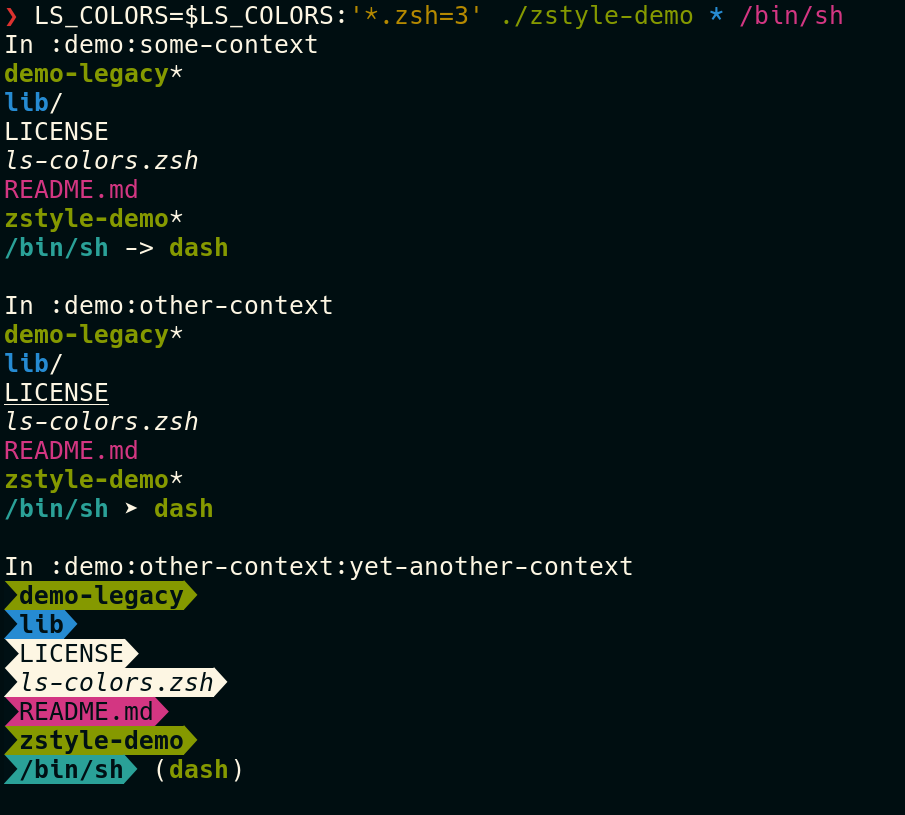A zsh library to use LS_COLORS in scripts or other plugins.
For a simple demo, see the zstyle-demo script in this repo.
If a use case isn't adequately covered, please open an issue!
Finally, if you are making use of this plugin, add it to the wiki!
You can use this as a submodule or a subtree.
# Add (only once)
git submodule add git://github.com/xPMo/zsh-ls-colors.git ls-colors
git commit -m 'Add ls-colors as submodule'
# Update
cd ls-colors
git fetch
git checkout origin/master
cd ..
git commit ls-colors -m 'Update ls-colors to latest'# Initial add
git subtree add --prefix=ls-colors/ --squash -m 'Add ls-colors as a subtree' \
git://github.com/xPMo/zsh-ls-colors.git master
# Update
git subtree pull --prefix=ls-colors/ --squash -m 'Update ls-colors to latest' \
git://github.com/xPMo/zsh-ls-colors.git master
# Or, after adding a remote:
git remote add ls-colors git://github.com/xPMo/zsh-ls-colors.git
# Initial add
git subtree add --prefix=ls-colors/ --squash -m 'Add ls-colors as a subtree' ls-colors master
# Update
git subtree pull --prefix=ls-colors/ --squash -m 'Update ls-colors to latest' ls-colors master This function takes a context and a list of files as input,
and returns a list of colored strings, formatted according to $format.
${prefix}::fmt [ -f $format | -F $format ] [ -o | -0 | -a | -A ] $context $files[@]Since functions are a public namespace, This library allows you to customize the preifix for your plugin:
# load function as my-lscolors::fmt
# The remaining arguments to source determines which lib/ files you want to load.
# If no arguments are provided, then all lib/*.zsh are loaded.
source ${0:h}/ls-colors/ls-colors.zsh my-lscolors fmtThe ::fmt function uses the usual list-colors style to determine how to color the results.
Set the style as follows:
# Uses LS_COLORS format
zstyle $pattern list-colors ${(s[:])LS_COLORS} '*.ext=1'In addition, you can enable extendedglob for certain contexts:
zstyle $pattern list-colors-extended true
zstyle $pattern list-colors ${(s[:])LS_COLORS} '(#i).ext=1'Personally, I like this method for dynamically getting LS_COLORS for all contexts:
zstyle -e '*' list-colors 'reply=(${(s[:])LS_COLORS})'The ::fmt function uses the list-format style to determine how to format the results.
Set the style as follows:
zstyle $pattern list-format '%F%P%r%(h.%I%i. -> %L%l%r)'| Format specifier | Meaning | Example (PWD=/usr, ./bin/sh symlinked to dash) |
|---|---|---|
%F |
The color/console codes which match the file | \e[0m\01;36m |
%f |
The file basename | sh |
%P |
The file path provided | ./bin/sh |
%p |
The fully-qualified path | /usr/bin/sh |
%L |
The color/console codes which match the target of the symlink | \e[0m\e[01;32m |
%l |
The target of the symlink | dash |
%h |
1 if this file is a symlink, otherwise empty (useful to conditionally output the link target) |
1 |
%r |
The color/console codes normally used to reset the terminal style | \e[0m |
%I |
The color for filetype indicators | \e[0m |
%i |
The single-character filetype indicator the given file | @ |
%j |
The single-character filetype indicator for the target of the symlink | * |
For more information on using these codes, see the section on zformat in man zshmodules.
More format specifiers may be added in the future, probably based on GNU find's -printf formats.
There are two flags to the ::fmt function which change how list-format is used:
${prefix}::fmt -f $format # use $format if no list-format is specified for the current style
${prefix}::fmt -F $format # force $format, ignore the list-format specified for the current styleThere are four ways ::fmt can return its results:
${prefix}::fmt -a ... # [default] assign results to $reply as an array
${prefix}::fmt -A ... # assign results to $reply as an associative array, with filenames as keys
${prefix}::fmt -o ... # print results to stdout separated by newlines
${prefix}::fmt -0 ... # print results to stdout separated by NUL charactersFor more advanced usage,
instructions are located at top of the source files for from-mode and from-name.
Since functions are a public namespace, this plugin allows you to customize the preifix for your plugin:
# load functions as my-lscolors::{init,match-by,from-name,from-mode}
# The remaining arguments to source determines which lib/ files you want to load.
# If no arguments are provided, then all lib/*.zsh are loaded.
source ${0:h}/ls-colors/ls-colors.zsh my-lscolors legacyWhile indirect parameter expansion exists with ${(P)var},
it doesn't play nicely with array parameters,
and especially not with associative arrays.
There are multiple strategies to prevent unnecessary re-parsing:
Call init in global scope.
This pollutes global namespace but prevents re-parsing $LS_COLORS on every function call.
ls-color::initDon't call init at all:
This is only compatible with ::match-by,
and reparses LS_COLORS each time,
but it doesn't pollute global namespace.
ls-color::match-by $file lstatInitialize within a scope with local parameters. Best for not polluting global namespace when multiple filenames need to be parsed.
(){
local -A namecolors modecolors
ls-color::init
for arg; do
...
done
}Custom parameter: Save the array value as your own custom parameter to copy back.
(){ # initially
local -A namecolors modecolors
ls-color::init
typeset -ga _my_modecolors=("${(@kv)modecolors}") # you MUST use (@kv) to avoid losing empty entries
typeset -ga _my_namecolors=("${(kv)namecolors[@]}") # alternatively, use bash-style [@]
}
my-function(){
local -A modecolors=("${(@)_my_modecolors}") # you MUST use (@) to avoid losing empty entries
local -A namecolors=("${_my_namecolors[@]}") # alternatively, use bash-style [@]
...
}You can find the plugin at xPMo/zsh-ls-colors.
